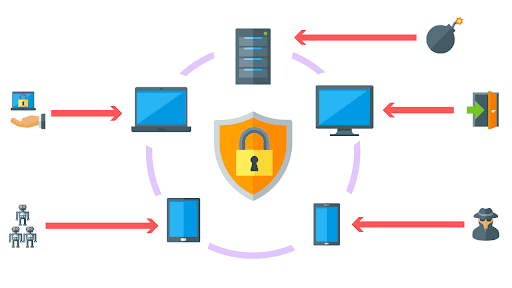Endpoint detection and response (EDR) is a next-generation security system that monitors your system's endpoints, such as laptops, desktop computers, and mobile devices. EDR collects endpoint log data and has rule-based automated response and behavior analysis capabilities in addition to real-time monitoring.
EDR is a smarter, next-generation variant of anti-virus. In contrast to traditional anti-virus technology, EDR actively seeks dormant threats in your endpoints by analyzing user behavior and flagging any strange or malicious event. But what is the goal of EDR? Let's learn about what is the goal of EDR.

Why is EDR Important - what is the goal of EDR?
What is the goal of EDR? - All organizations should know that with motivation, time, and resources, adversaries will soon find a way to breach your defenses, no matter how advanced they are. The following are some compelling reasons for the goal of EDR and why endpoint security should include EDR.
Prevention alone can't ensure 100 percent protection
Your company's current endpoint security solution may leave you in the dark when prevention fails. Attackers use this situation to linger and navigate within your network. When we talk about what is the goal of EDR, EDR primarily strives to prevent this situation.
Adversaries can be inside your network and return at will
As a result of silent failure, attackers are free to wander around in your environment, often creating back doors that let them return at any time. A third party, such as law enforcement or the organization's customers or suppliers, discovers most breaches.
Organizations need more visibility to monitor endpoints effectively is the goal of EDR.
When a breach is discovered, the victim organization may spend months attempting to remediate the incident due to a lack of visibility into what and how it happened and how to fix it — only to have the attacker return within a few days.
Access to actionable intelligence is needed to respond to an incident
Organizations may need more visibility to understand what is happening on their endpoints. Still, they may also need help to record what is relevant to security, store it, and retrieve it quickly enough when needed. This is the goal of EDR.
Having the data is only part of the solution is the goal of EDR.
Even when data is accessible, security teams require the resources to analyze and fully exploit it. As a result, many security teams discover that shortly after deploying an event collection product, such as a SIEM, they are often confronted with a complex data problem. Knowing what to look for, speed and scalability issues emerge, and other issues emerge before their primary objectives can even be addressed.
Remediation can be protracted and costly.
Without the above-said abilities, organizations can spend weeks determining what actions to take. Often, the only option is to reimage machines, which can interrupt business processes, degrade productivity, and result in significant financial loss.
Why EDR is essential to businesses? - What is the Goal of EDR?
When we talk about what is the goal of EDR, most businesses are yet vulnerable to a wide range of cyberattacks. These range from simple, opportunistic attacks, like a threat actor sending an email attachment containing known ransomware, to more advanced attacks, in which threat actors attempt to hide known exploits or attack methods using evasion techniques such as running malware in memory.
As a result, endpoint security is a critical component of any company's cybersecurity strategy. While network-based defenses can block many cyberattacks, some will get through. Others, such as malware on removable media, can bypass these defenses completely. An endpoint-based defense solution allows a company to implement more EDR security and improves its chances of detecting and responding to threats.
What is the goal of EDR? - The importance of strong endpoint protection such as EDR has grown as organizations worldwide shift to remote working. Employees working from home may not be as well protected against cyber threats as on-site workers, and they may be using personal devices that lack the most recent updates and security patches. Employees who work remotely may be less concerned with cyber security than those who work in a traditional office setting.
As a result, organizations and their employees face new cybersecurity threats. EDR Endpoint security is critical because it protects employees from threats and prevents criminals from using a remote worker's computer to attack an organization's network.
Remediation to address a breach can be challenging and costly, which is the single most important reason to acknowledge the goal of EDR and why EDR is required. Without an EDR solution, organizations can spend weeks deciding what actions to take, and often their only option is to reimage machines, which can be very destructive, reducing productivity and risking financial loss.
Conclusion -What is the Goal of EDR?
Now that you know the goal of EDR, Xcitium Advanced can help you attain the same. Xcitium Advanced is an EDR (Endpoint Detection And Response) bundle that assists you in understanding threats and maturing your security program by knowing not only that an attack occurred and was virtualized and contained but also exactly what happened, where your vulnerabilities lie and how to better prepare for future threats. Visit for more details on what is the goal of EDR and Xcitium EDR.
